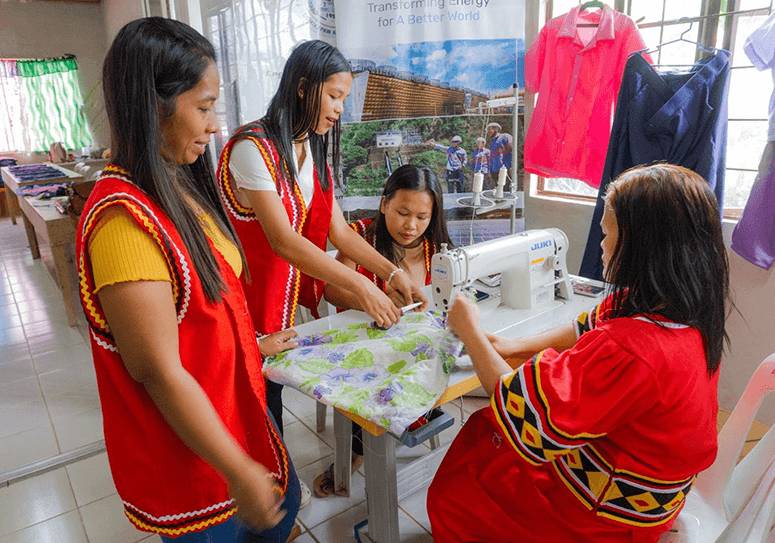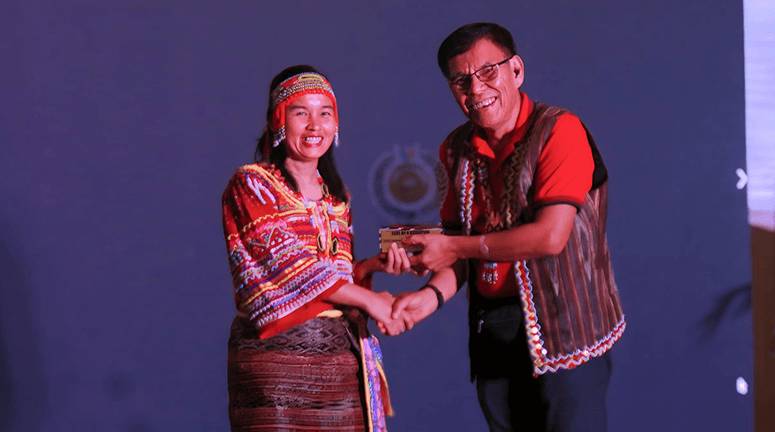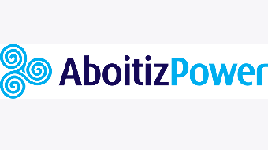Cultivating seeds together

The priceless Rice Terraces of the Philippine Cordilleras is a mark of the proud Ifugao people, bearing witness to 2,000 years of sustainable farming, culture, and people development.
Knowledge of its intricate irrigation network is passed on from generation to generation. To this day, farmers still rely on this network to nurture tradition, the ecosystem, and the community’s livelihood.
SN Aboitiz Power (SNAP) took note of the need to help the indigenous community in the Cordilleras preserve the rice terraces. Consequently, in 2019, SNAP came up with a watershed management program called Partnership in Uplifting Upland Natural Resources, Livelihood, and Assets - Upper Magat Watershed Management Program or PUNLA-Upper Magat. The program’s goal is to help protect and restore critical watershed areas in Ifugao and boost agricultural productivity.
SNAP is a joint venture between Scatec of Norway and Aboitiz Power Corporation (AboitizPower) for the operation of large hydropower facilities in Luzon, including the 388 megawatt Magat Hydro in Ifugao.
A boost to local productivity
Covering the Upper Magat Watershed and supporting integrated projects in adjacent municipalities, PUNLA has been beneficial to local communities. It has helped restore stonewalls, establish agroforestry and demonstration farms, provide agricultural and food processing equipment, build forest nurseries and greenhouses, and plant native tree species.
Under the banner of PUNLA, productivity has been reinstated in close to 28 hectares of rice terraces in Mayoyao. The same program has rehabilitated approximately six hectares of previously abandoned rice terraces. Moreover, over 48 hectares of forest was rehabilitated in Banaue, while a 52-hectare site in Hungduan was reforested.
With the help of PUNLA in the Cordilleras, the use of the Ifugao Rice Terraces—with traditions, ecosystems, and livelihoods depending on it—can be passed on to the next generation.
“Maganda ‘yung project dahil nakakapagtanim kami para rin sa kinabukasan; may aantayin ‘yung mga bata o ‘yung pamilya namin (This project is remarkable because it enables us to plant not only for the present but also for the future; something that our children and families can look forward to),” said IP farmer Juliano Diclihon.
Support for communities
Much like PUNLA, which is the Filipino word for “the cultivation of seeds,” AboitizPower hopes that IPs and other host communities will cultivate the seeds it has sown in local development initiatives.
The program is certainly lucrative for its beneficiaries. Since 2018, SNAP has remitted over P167 million in community shares to the host communities of SNAP-Magat and SNAP-Benguet. This is in compliance with the Philippine government’s Energy Regulations No. 1-94 (ER 1-94) policy.
ER 1-94 is meant to ensure that host communities get a reasonable share of the profit from power plants operating in their area. It states that these communities will receive one centavo for every kilowatt-hour (P0.01/kWh) of electricity generated.
Beneficiaries used the funds generated by SNAP for the electrification of public areas and households, reforestation, watershed management, health and environment enhancement, and development and livelihood.
Hedcor, an AboitizPower renewable energy asset manager, has taken a similar initiative. It has allocated royalty shares to fund developmental projects that further the growth and sustainability of ancestral domains within the communities where it operates.
Hedcor has over 45 years of experience in operating renewable energy assets. These are mostly run-of-river hydropower systems, with facilities in Ilocos Sur, Mountain Province, Benguet, Davao, and Bukidnon.
Since 2015, various IP communities in Benguet and Mountain Province have utilized over P30 million in royalty shares and other financial benefits to build infrastructure, support local livelihoods, and protect their ancestral domains and native forests. Projects that have significantly benefited them are the fencing of the watershed perimeter in Sabangan and the planting of indigenous tree species to improve water retention and contribute to watershed sustainability.
Similarly, in Sta. Cruz, Davao del Sur, IP communities have received over P45 million in royalty shares since 2010. These shares support education, healthcare, skills training, cultural preservation, and infrastructure, including the concreting of critical slopes and the development of water systems for the Bagobo-Tagabawa tribes.
“The financial support from Hedcor is more than just a contribution; it’s an investment in our future,” said Matanam Gideon Tolentino, an IP leader. “These funds will enable us to create sustainable programs that elevate our quality of life while preserving our cultural heritage. This partnership is essential to our community’s growth and long-term sustainability.”
Ensuring a solid future for IP youth
Beyond rightfully allocating community and royalty shares from the operation of its power plants in the area, AboitizPower is uplifting its social responsibility to IPs through its corporate social responsibility programs.
Akin to this IP month’s theme of “Valuing, Nurturing, and Honoring Indigenous Peoples and Indigenous Knowledge,” SNAP and Hedcor are also supporting the future of the IPs through the education of their youth.

SNAP runs the BRIGHTS education program—an abbreviation for “Bridging Gaps in Higher Education through Tertiary Scholarships.” This program gives deserving students from its host communities, including IPs, opportunities to become well-rounded individuals through scholarships, financial aid, seminars, and volunteer outreach programs.
For the school year 2024, BRIGHTS graduated 11 beneficiaries, six of whom had Latin honors and two, honorable mentions. Since its inception in 2018, a total of 115 college scholars have received educational assistance through the program. Three former BRIGHTS scholars are currently employed in SNAP.

“BRIGHTS gave me a solid foundation. Salamat ja pasiya (thank you so much),” said beneficiary Jasmin Montes, an Ibaloi who also recently joined SNAP-Benguet as a corporate social responsibility assistant. “I started building my future with SNAP, and to this day I continue to build it with them. Now, I’m also helping them build their future, and, in turn, the future of the communities they serve.”
Meanwhile, Hedcor’s education initiatives also help provide IPs with access to higher education, giving the youth the opportunity to make meaningful contributions to their respective communities. Since offering scholarships in 2010, there have been 57 scholars from its host communities across Luzon and Mindanao, with the majority being IPs.
Because of its support for IP communities in the Davao region, Hedcor was named “Champion for Indigenous Peoples” by the National Commission on Indigenous Peoples (NCIP) Region XI. They were cited as “uplifting the lives of IP communities, while respecting and preserving their cultural heritage” and setting “a standard for corporate responsibility.”
AboitizPower believes that sustaining the business is about building strong and lasting relationships. By upholding social responsibility and being a good neighbor, it looks beyond power generation and distribution to genuinely transform energy for a better world for IPs and host communities.
* * *
Editor’s Note: This article was provided by Aboitiz Power Corporation.



